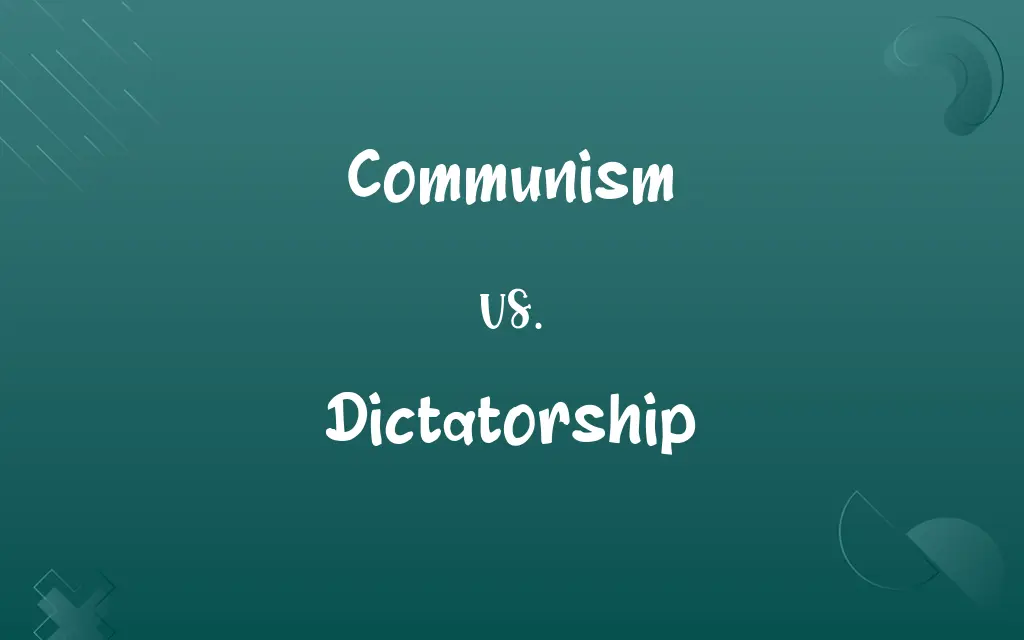Communism vs. Dictatorship: Know the Difference

By Shumaila Saeed || Published on January 3, 2024
Communism is an ideology advocating for a classless society and communal ownership of resources. Dictatorship is a form of government where power is centralized in the hands of a single leader or small group.

Key Differences
Communism is a socio-economic system that promotes the abolition of private property and the establishment of a communal society where resources are shared. Dictatorship, on the other hand, refers to a political system where absolute power is concentrated in the hands of an individual or a small group, often disregarding democratic processes.
Shumaila Saeed
Jan 03, 2024
In communism, the goal is to achieve a stateless, classless society where everyone contributes and benefits equally. Dictatorship, in contrast, can exist in various economic systems and is characterized by authoritarian rule, where decisions are made by the leader without input from the populace.
Shumaila Saeed
Jan 03, 2024
Communism emphasizes collective ownership and egalitarian distribution of wealth, aiming to eliminate social class divisions. In a dictatorship, the leader may or may not focus on wealth distribution, with power dynamics and control being the central aspects.
Shumaila Saeed
Jan 03, 2024
The communist theory, as envisioned by thinkers like Marx and Engels, seeks to empower the working class to overthrow the capitalist system. Dictatorships, however, may arise in capitalist, socialist, or communist contexts, as they are defined by the concentration of power, not economic structure.
Shumaila Saeed
Jan 03, 2024
Communism, ideally, is guided by democratic principles where the community collectively makes decisions. A dictatorship, by its nature, lacks democratic elements, with decision-making processes being unilateral and top-down.
Shumaila Saeed
Jan 03, 2024
ADVERTISEMENT
Comparison Chart
Ideology
Classless, stateless society
Centralized power in individual or group
Shumaila Saeed
Jan 03, 2024
Economic System
Collective ownership of resources
Can exist in various economic systems
Shumaila Saeed
Jan 03, 2024
Power Structure
Aimed at democratic, communal decision-making
Centralized, authoritarian rule
Shumaila Saeed
Jan 03, 2024
Social Structure
Egalitarian, no class divisions
Power and control central to social structure
Shumaila Saeed
Jan 03, 2024
Historical Examples
Soviet Union, Maoist China
Nazi Germany, Francoist Spain
Shumaila Saeed
Jan 03, 2024
ADVERTISEMENT
Communism and Dictatorship Definitions
Communism
Communism aims to establish a stateless society where government is unnecessary.
The ultimate goal of communism was to reach a state where governing bodies were no longer needed.
Shumaila Saeed
Dec 19, 2023
Dictatorship
Dictatorship is a form of government where power is concentrated in the hands of one person.
The dictatorship imposed strict censorship on all media outlets.
Shumaila Saeed
Dec 19, 2023
Communism
Communism is based on the principles of communal living and mutual aid.
In a communist community, everyone contributed to childcare and education equally.
Shumaila Saeed
Dec 19, 2023
Dictatorship
Dictatorship usually features centralized control and decision-making.
In the dictatorship, all major decisions were made by the supreme leader alone.
Shumaila Saeed
Dec 19, 2023
Communism
Communism promotes the abolition of private property for communal ownership.
In a communist system, land was not owned by individuals but by the community.
Shumaila Saeed
Dec 19, 2023
ADVERTISEMENT
Dictatorship
Dictatorship can exist independently of the economic system in place.
Despite the capitalist economy, the country was under a military dictatorship.
Shumaila Saeed
Dec 19, 2023
Communism
Communism is a political and economic ideology seeking a classless society.
Under communism, the factory was owned collectively by the workers.
Shumaila Saeed
Dec 19, 2023
Dictatorship
Dictatorship may be established through force or the erosion of democratic institutions.
The dictatorship began with the gradual dismantling of democratic processes.
Shumaila Saeed
Dec 19, 2023
Communism
A theoretical economic system characterized by the collective ownership of property and by the organization of labor for the common advantage of all members.
Shumaila Saeed
Dec 13, 2023
Dictatorship
Dictatorship often involves the suppression of political opposition.
The dictator jailed those who opposed his regime.
Shumaila Saeed
Dec 19, 2023
Communism
A system of government in which the state plans and controls the economy and a single, often authoritarian party holds power, claiming to make progress toward a higher social order in which all goods are equally shared by the people.
Shumaila Saeed
Dec 13, 2023
Communism
The Marxist-Leninist doctrine advocating revolution to overthrow the capitalist system and establish a dictatorship of the proletariat that will eventually evolve into a perfectly egalitarian and communal society.
Shumaila Saeed
Dec 13, 2023
Communism
Any far-left political ideology or philosophy advocating holding the production of resources collectively, especially by seizing it through revolution.
Shumaila Saeed
Dec 13, 2023
Communism
Any political social system that implements a communist political philosophy.
Shumaila Saeed
Dec 13, 2023
Dictatorship
A type of government where absolute sovereignty is allotted to an individual or a small clique.
Shumaila Saeed
Dec 13, 2023
Communism
The international socialist society where classes, money, and the state no longer exist.
Shumaila Saeed
Dec 13, 2023
Communism
A scheme of equalizing the social conditions of life; specifically, a scheme which contemplates the abolition of inequalities in the possession of property, as by distributing all wealth equally to all, or by holding all wealth in common for the equal use and advantage of all.
Shumaila Saeed
Dec 13, 2023
Dictatorship
Any household, institution, or other organization that is run under such sovereignty or autocracy.
Shumaila Saeed
Dec 13, 2023
Dictatorship
The office, or the term of office, of a dictator; hence, absolute power.
Shumaila Saeed
Dec 13, 2023
Dictatorship
A form of government in which the ruler is an absolute dictator (not restricted by a constitution or laws or opposition etc.)
Shumaila Saeed
Dec 13, 2023
Communism
Communism envisions a society where wealth and resources are distributed equally.
The communist government distributed food and housing resources equally among citizens.
Shumaila Saeed
Dec 19, 2023
Repeatedly Asked Queries
What is a dictatorship?
A dictatorship is a government system where a single person or a small group holds absolute power.
Shumaila Saeed
Jan 03, 2024
How does a dictatorship maintain power?
Through centralized control, often involving force, censorship, and suppression of opposition.
Shumaila Saeed
Jan 03, 2024
Can a communist state be a dictatorship?
Yes, historically, some communist states have been dictatorships, though this is not a requirement of communism.
Shumaila Saeed
Jan 03, 2024
How does communism view private property?
Communism seeks to abolish private property in favor of communal ownership.
Shumaila Saeed
Jan 03, 2024
Are all dictatorships communist?
No, dictatorships can exist in various economic systems, including capitalist ones.
Shumaila Saeed
Jan 03, 2024
Is communism inherently undemocratic?
Not necessarily; in theory, communism advocates for communal decision-making, which can be democratic.
Shumaila Saeed
Jan 03, 2024
What characterizes the leadership in a dictatorship?
The leadership in a dictatorship is often autocratic, with power concentrated in a single leader or group.
Shumaila Saeed
Jan 03, 2024
What is communism?
Communism is an ideology advocating for a classless, stateless society with communal ownership of resources.
Shumaila Saeed
Jan 03, 2024
Can a dictatorship have a fair legal system?
It's challenging, as dictatorships often manipulate legal systems to maintain power.
Shumaila Saeed
Jan 03, 2024
How are resources distributed in communism?
Ideally, resources in a communist society are distributed based on need, not wealth or status.
Shumaila Saeed
Jan 03, 2024
Do dictatorships have political parties?
Some do, but they are often for show, with the real power resting with the dictator.
Shumaila Saeed
Jan 03, 2024
Can communism adapt to modern economic challenges?
It's a matter of debate, with some arguing it can adapt and others seeing it as incompatible.
Shumaila Saeed
Jan 03, 2024
Do communist societies have classes?
The goal of communism is to create a classless society, though this has been difficult to achieve in practice.
Shumaila Saeed
Jan 03, 2024
What happens to dissent in communist societies?
In some communist societies, dissent has been suppressed, similar to dictatorships.
Shumaila Saeed
Jan 03, 2024
Is economic equality achievable under communism?
In theory, yes, but in practice, achieving complete economic equality has proven difficult.
Shumaila Saeed
Jan 03, 2024
Can dictatorships be economically progressive?
Yes, some dictatorships have implemented progressive economic policies, though often at the cost of personal freedoms.
Shumaila Saeed
Jan 03, 2024
Are dictatorships always violent?
Not always, but many have used violence or the threat of it to maintain control.
Shumaila Saeed
Jan 03, 2024
Can communism work in large, diverse countries?
This remains a topic of debate; large-scale successful implementation has been challenging.
Shumaila Saeed
Jan 03, 2024
How do dictatorships impact international relations?
They can vary, but dictatorships often face international criticism and sanctions for human rights abuses.
Shumaila Saeed
Jan 03, 2024
Is there a peaceful way to end a dictatorship?
Yes, through internal reforms, external pressure, or peaceful revolution, though it's often challenging.
Shumaila Saeed
Jan 03, 2024
Share this page
Link for your blog / website
HTML
Link to share via messenger
About Author
Written by
Shumaila SaeedShumaila Saeed, an expert content creator with 6 years of experience, specializes in distilling complex topics into easily digestible comparisons, shining a light on the nuances that both inform and educate readers with clarity and accuracy.









































































